The first image shows an interesting dipole pattern anchored on the plane of the Milky Way. This looks like a local feature and not something in the far background.
Russian Space Program: News & Discussion #4

kvs- Posts : 15480
Points : 15617
Join date : 2014-09-11
Location : Turdope's Kanada
The first image shows an interesting dipole pattern anchored on the plane of the Milky Way. This looks like a local feature and not something in the far background.

Big_Gazza- Posts : 4758
Points : 4750
Join date : 2014-08-25
Location : Melbourne, Australia
Most of the "soft" x-ray sources seen by ART-XC are spead along the galactic plane, ie they are in our local galaxy. Those few intergalactic sources like the Virgo or Perseus clusters don't have much visibility in "hard" x-rays (the Coma cluster looks to be an exception)kvs wrote:The Russian instrument is going to pick up discrete sources whereas the German instrument will also pick up re-emission by dust and will thus be more diffuse.
The first image shows an interesting dipole pattern anchored on the plane of the Milky Way. This looks like a local feature and not something in the far background.
eROSITA map with the sources identified proves the point nicely


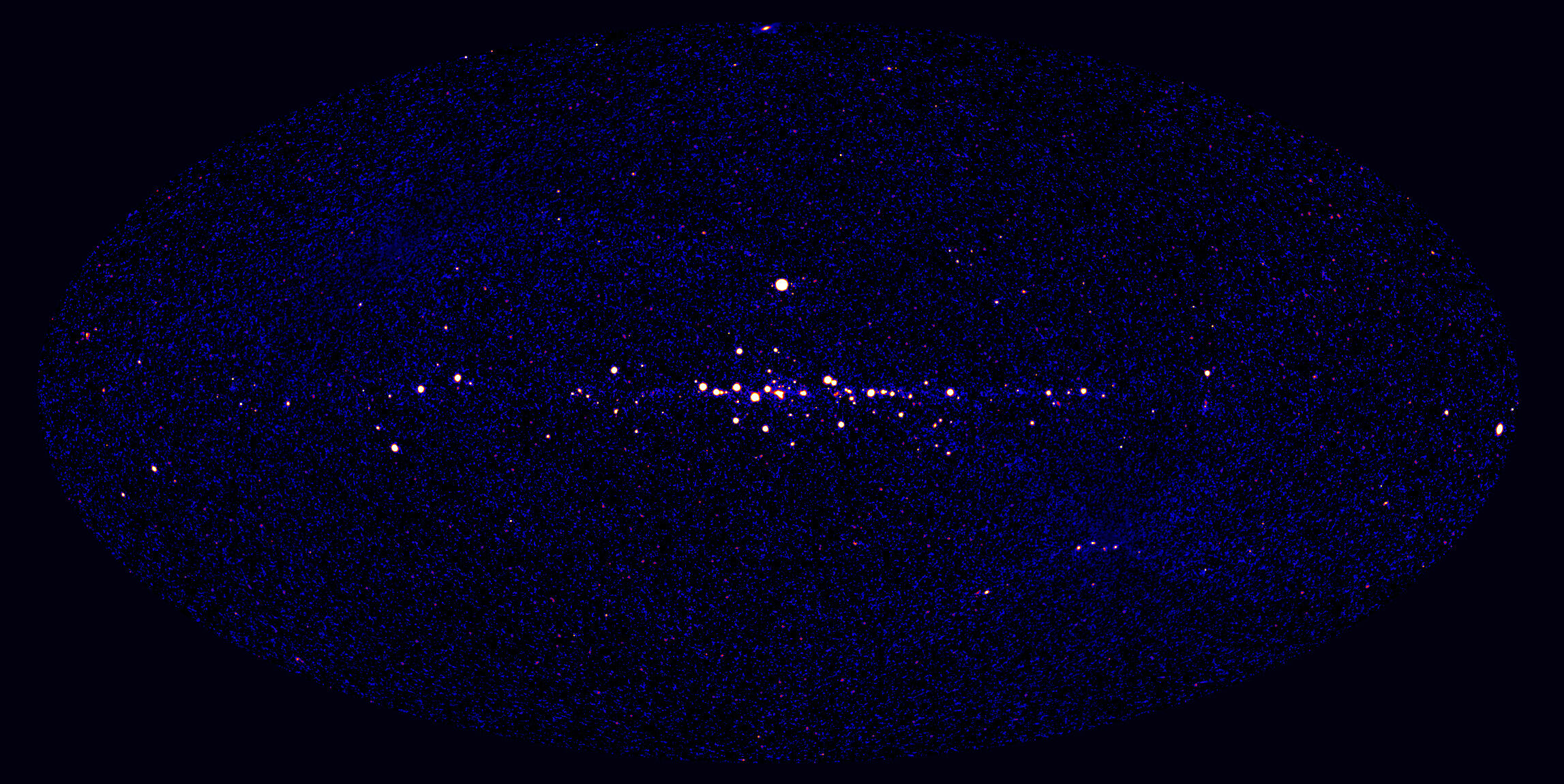
Regarding the so-called "North Polar Spur" there is a lot of controversy over its size and distance. Some claim its huge and distant, some say its much closer (as X-rays are blocked by dust and gas and only the powerful condensed sources can be seen over distances). I wonder if its apparent proximity to Scorpius X-1 (*) is just a coincidence or whether the two are associated? Could X-1 be exciting a nearby gas cloud to fluoresce in soft X-rays? Plausible, but since X-1 if ~9000 light years distant it would need to be a HUGE cloud and I doubt even X-1 is putting out that much power.
(*) X-1 is the most powerful X-ray source seen from earth apart from Sol. Its a neutron star that is gravitationally accreting mass from a neighbouring companion and heating the stolen gas to millions of degrees such that it becomes a powerful X-ray emitter.
Hmm... "stolen gas"... Sounds very Ukrainian.... I propose we change its name to Ukropi-1
NPS is also well shown in maps taken at RF frequencies.
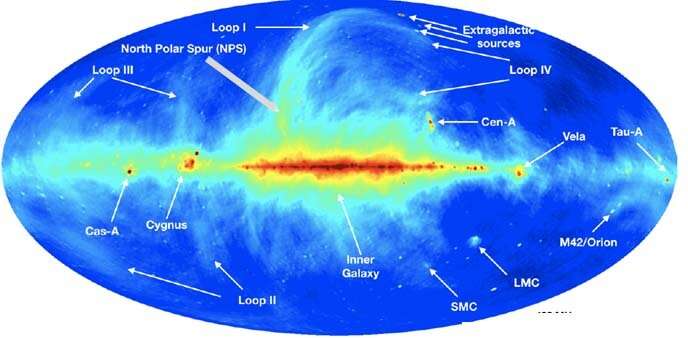

kvs- Posts : 15480
Points : 15617
Join date : 2014-09-11
Location : Turdope's Kanada
the energy of the photon, the more it resists deflection and even absorption. Gamma rays are examples of this behaviour.
Since the sources are mostly local, the dipole feature is some sort of dust plume structure. If it is magnetized then it will respond to
the magnetic field generated by the galaxy as it rotates. Even a weak magnetic field is important on long timescales.
https://www.sciencealert.com/a-new-study-has-revealed-the-colossal-magnetic-field-of-a-spiral-galaxy
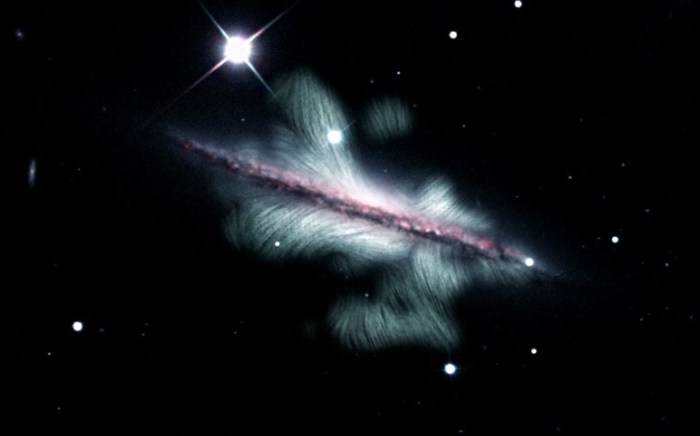
This is NGC 4217 and the distribution of the magnetic field of the Milky Way is going to have its own features.
franco and Big_Gazza like this post

Big_Gazza- Posts : 4758
Points : 4750
Join date : 2014-08-25
Location : Melbourne, Australia
The final stage of prelaunch preparation of the multipurpose laboratory module "Science" begins in the assembly and test building of site No. 254 of the Baikonur cosmodrome. Today, June 21, 2021, a joint crew of specialists from the State Corporation Roscosmos (Rocket and Space Corporation Energia named after S.P. compartment of the third stage of the launch vehicle.
This compartment is a part of the space warhead and provides mechanical connection of the module with the nose fairing, as well as its electrical connection with the onboard control system of the launch vehicle. In accordance with the schedule of the standard training program, after the completion of the docking work, the control weighing of the module will take place, and then the specialists will proceed with the final assembly of the space warhead and operations for refueling the fuel tanks of the module.
source


GarryB, kvs, Hole, Kiko and Russian_Patriot_ like this post

Kiko- Posts : 3203
Points : 3261
Join date : 2020-11-11
Age : 75
Location : Brasilia
MOSCOW, June 25 - RIA Novosti. At the Plesetsk cosmodrome in the Arkhangelsk region at 22:50 Moscow time, the Soyuz-2.1b carrier rocket with a new generation satellite was successfully launched, the Defense Ministry said.
At 22:52 Moscow time, the rocket was accepted for escort by ground-based facilities of the Main Testing Space Center named after G.S. Titov of the Space Forces of the Aerospace Forces.
"The Soyuz-2.1b medium-class launch vehicle at the set time has successfully launched a spacecraft into the calculated orbit in the interests of the Ministry of Defense," the department added.
It is emphasized that the launch and launch of the spacecraft took place in the normal mode.
This is the second launch of a carrier of this type from Plesetsk in 2021.
Flight tests of the Soyuz-2 space rocket complex began at the Plesetsk cosmodrome on November 8, 2004. Over the past sixteen years, 46 medium-class Soyuz-2 launches 1a and 1b have been carried out, as well as six light-class Soyuz-2 launches of the 1c modernization stage.
https://ria.ru/20210625/raketa-1738692082.html
Big_Gazza and Russian_Patriot_ like this post

Big_Gazza- Posts : 4758
Points : 4750
Join date : 2014-08-25
Location : Melbourne, Australia
Kiko wrote:Soyuz-2.1b launch vehicle successfully launched from Plesetsk cosmodrome
MOSCOW, June 25 - RIA Novosti. At the Plesetsk cosmodrome in the Arkhangelsk region at 22:50 Moscow time, the Soyuz-2.1b carrier rocket with a new generation satellite was successfully launched, the Defense Ministry said.
At 22:52 Moscow time, the rocket was accepted for escort by ground-based facilities of the Main Testing Space Center named after G.S. Titov of the Space Forces of the Aerospace Forces.
"The Soyuz-2.1b medium-class launch vehicle at the set time has successfully launched a spacecraft into the calculated orbit in the interests of the Ministry of Defense," the department added.
It is emphasized that the launch and launch of the spacecraft took place in the normal mode.
This is the second launch of a carrier of this type from Plesetsk in 2021.
Flight tests of the Soyuz-2 space rocket complex began at the Plesetsk cosmodrome on November 8, 2004. Over the past sixteen years, 46 medium-class Soyuz-2 launches 1a and 1b have been carried out, as well as six light-class Soyuz-2 launches of the 1c modernization stage.
https://ria.ru/20210625/raketa-1738692082.html
It looks to be the first Pion-NKS ELINT and radar-imaging bird. Specifically designed to image ships and provide guidance for long range AShMs.

More pls.
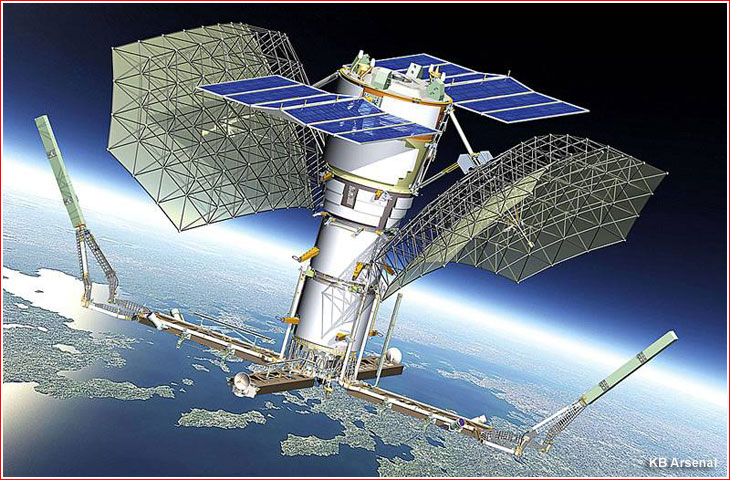
More info at Zaks site:
dino00, lancelot, TMA1 and Russian_Patriot_ like this post

Kiko- Posts : 3203
Points : 3261
Join date : 2020-11-11
Age : 75
Location : Brasilia
MOSCOW, June 27 - RIA Novosti. The launch complex of the Soyuz-2 carrier rocket at the Vostochny cosmodrome is planned to be completely transferred to the use of new fuel by February 2022, the press service of the Center for Operation of Ground Space Infrastructure Facilities ( Roscosmos enterprise) told RIA Novosti.
As reported, the need to convert the Soyuz-2 missiles on Vostochny from kerosene (T-1) to naphthyl (RG-1) is associated with the depletion of the Anastasievsko-Troitskoye field in the Krasnodar Territory . At present, naphthyl is used only in the third stage of the Soyuz-2.1b rocket, but it is planned to refuel all stages of the Soyuz with it, for which the upgraded engines have already been tested.
"To convert the launch complex (SC) of the Soyuz-2 space rocket complex to naphthyl fuel, it is necessary to complete the installation of equipment, conduct autonomous tests of the equipment under development and comprehensive tests of the SC. All the necessary equipment for these purposes has been delivered to the cosmodrome, some have already been mounted" said the interlocutor of the agency.
According to him, the specialists of the TsENKI branch, the Vostochny space center, will begin work on completing the installation, commissioning and autonomous testing of the equipment in October 2021.
"It is planned to ensure readiness for complex tests of the launch complex after transfer to naphthyl in February 2022," the press service of the enterprise added.
Earlier, the executive director of " Rostec " Oleg Yevtushenko said that the transition to the naphthyl part of the missile modernization program, which will reduce emissions and significantly increase the on-orbit payload.
Naphthyl is an environmentally friendly type of hydrocarbon fuel with the use of polymer additives.
As reported by a RIA Novosti source in the rocket and space industry, a test launch of the Soyuz-2.1a rocket with all stages operating on naphthyl is planned to be carried out from the Vostochny cosmodrome when the Kondor-FKA radar satellite for Earth remote sensing is launched into orbit. It is currently slated for 2022.
https://ria.ru/20210627/toplivo-1738773084.html
dino00, PapaDragon, Hole, lancelot and Russian_Patriot_ like this post

Big_Gazza- Posts : 4758
Points : 4750
Join date : 2014-08-25
Location : Melbourne, Australia
The final stage of prelaunch preparation of the multipurpose laboratory module "Nauka" continues in the assembly and test building of site No. 254 of the Baikonur cosmodrome. Nauka now integrated into its payload shroud.
details


dino00, kvs, Hole, Russian_Patriot_ and Mir like this post

Big_Gazza- Posts : 4758
Points : 4750
Join date : 2014-08-25
Location : Melbourne, Australia
MOSCOW, June 29. / TASS /. The reconnaissance commission began work at the Vostochny cosmodrome to determine the launch site for the Amur methane rocket with a reusable stage. This was announced on Tuesday by the general director of Roscosmos Dmitry Rogozin.
"In the area of the Vostochny cosmodrome, a reconnaissance commission has begun work to determine the location of the launch complex for the Amur LNG reusable carrier rocket," Rogozin wrote on his Facebook page .
Roskosmos and the Progress RCC in October last year signed a contract for the development of a preliminary design of a space rocket complex with the first Russian reusable methane-fueled Amur rocket. The rocket will receive a recoverable first stage and will be launched from the Vostochny cosmodrome in the Amur region.
In February, Dmitry Baranov, General Director of the Progress RCC, told reporters that the preliminary design of the Amur methane launch vehicle is scheduled to be completed in the third quarter of 2021. In turn, the executive director of Roskosmos for promising programs and science Alexander Bloshenko said on the air of the Big Space program that the preliminary design would be completed in September.
The Amur with a reusable reusable stage will be capable of launching up to 10.5 tons of payload into low-earth orbit versus 8.5 tons for the Soyuz-2 series rockets.
source
thegopnik, Hole and Russian_Patriot_ like this post

Russian_Patriot_- Posts : 1286
Points : 1300
Join date : 2021-06-08
Roscosmos will demonstrate at MAKS-2021 a model of the latest Earth observation satellite "Resurs-PM", follows from the materials of the state corporation posted on the public procurement website. The model will be shown at the stand of the Progress RCC (part of Roscosmos) of the joint Roscosmos exposition. The Resurs-PM satellites, which will replace the previous generation Resurs-P satellites, will be able to conduct surveys in the visible and infrared ranges and are designed to create and update topographic maps, control environmental pollution, monitor natural emergencies, environmental monitoring and search for oil, gas and other mineral deposits.
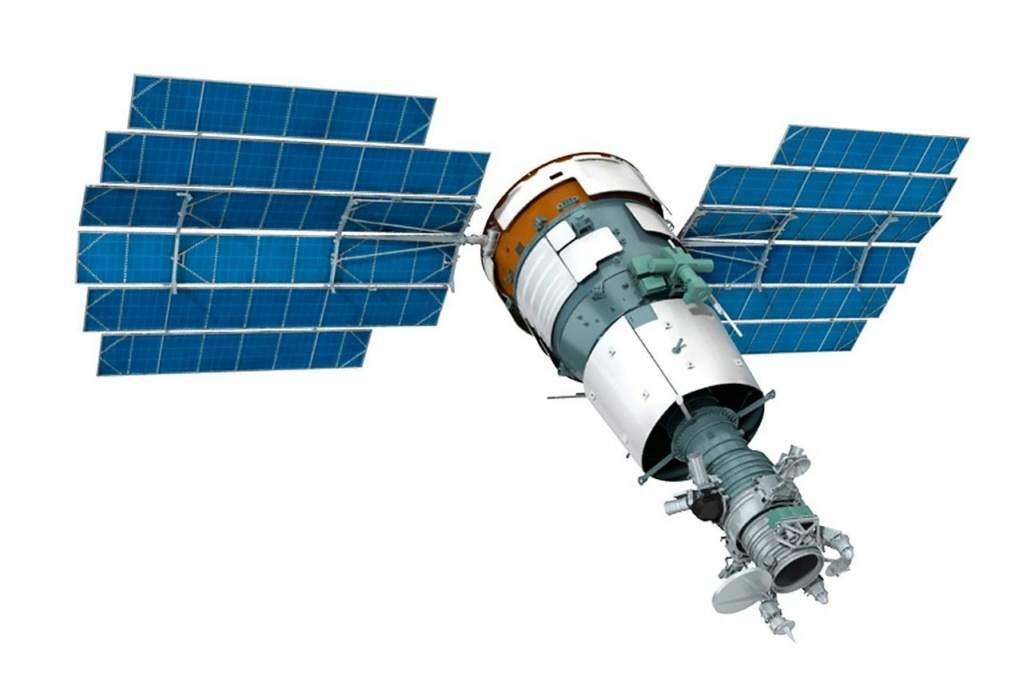
GarryB, Big_Gazza and Hole like this post

Big_Gazza- Posts : 4758
Points : 4750
Join date : 2014-08-25
Location : Melbourne, Australia
MOSCOW, June 30. / TASS /. The Progress MS-17 transport cargo vehicle, which is to deliver cargo to the International Space Station (ISS), separated from the third stage of the Soyuz-2.1a launch vehicle and began an autonomous flight. The broadcast is on the Roscosmos website .
The Progress MS-17 rendezvous with the ISS will take place according to a two-day schedule, the spacecraft docking with the Poisk module is scheduled for 04:02 Moscow time on July 2.
The Soyuz-2.1a launch vehicle was launched from the 31st platform (Vostok launch complex) of the Baikonur cosmodrome at 02:27 Moscow time. This is the second launch of a Russian cargo spacecraft to the International Space Station in 2021.
The cargo ship will deliver to the station 470 kg of refueling fuel, 420 liters of drinking water of the Rodnik system, 40 kg of oxygen cylinders, about 1,509 kg of dry cargo, including various equipment and materials in the cargo compartment, including resource equipment and technical means. maintenance of onboard systems, packing for space experiments, medical control and sanitary and hygienic supplies, clothing, standard rations and fresh food for the crew of the 65th main expedition.
source
dino00, LMFS, Hole and Russian_Patriot_ like this post

owais.usmani- Posts : 1794
Points : 1790
Join date : 2019-03-27
Age : 38
Today, July 1, 2021, at 15:48:33 Moscow time, the launch crews of the subsidiaries of the State Corporation Roscosmos at the Vostochny cosmodrome launched the Soyuz-2.1b carrier rocket with the Fregat upper stage and 36 new spacecraft of the company OneWeb as part of mission 48. At 15:57 Moscow time, the upper stage separated from the third stage of the carrier on a suborbital trajectory.
According to telemetry information, the launch, separation of the stages and the orbital block were carried out in the normal mode. After that, the Fregat upper stage continued to launch 36 vehicles into the target circular orbit. Over the next 3 hours and 40 minutes, OneWeb satellites, in accordance with the flight sequence, will be separated (in groups of four satellites) from the Russian "accelerator" produced by the S.A. Lavochkin (part of the Roscosmos State Corporation). The spacecraft are launched into an orbit with an altitude of 450 km, after which they are independently launched into 12 preset planes.
With this launch, the OneWeb LEO constellation will increase by another 36 satellites and reach 254 satellites. Thus, the orbital constellation will be 100% manned to cover all regions north of latitude 50. This launch will open up full-fledged access to services in the UK, Alaska, Northern Europe, Greenland, Iceland, the continental United States, the seas of the Arctic Ocean and Canada.
Today's launch was the fifth commercial launch from the Vostochny cosmodrome implemented under contracts between Glavkosmos (part of Roscosmos) with the European launch services provider Arianespace (operator of OneWeb spacecraft launches using the Soyuz-2 launch vehicle) and Starsem for the satellite operator. group OneWeb from the Russian cosmodrome.
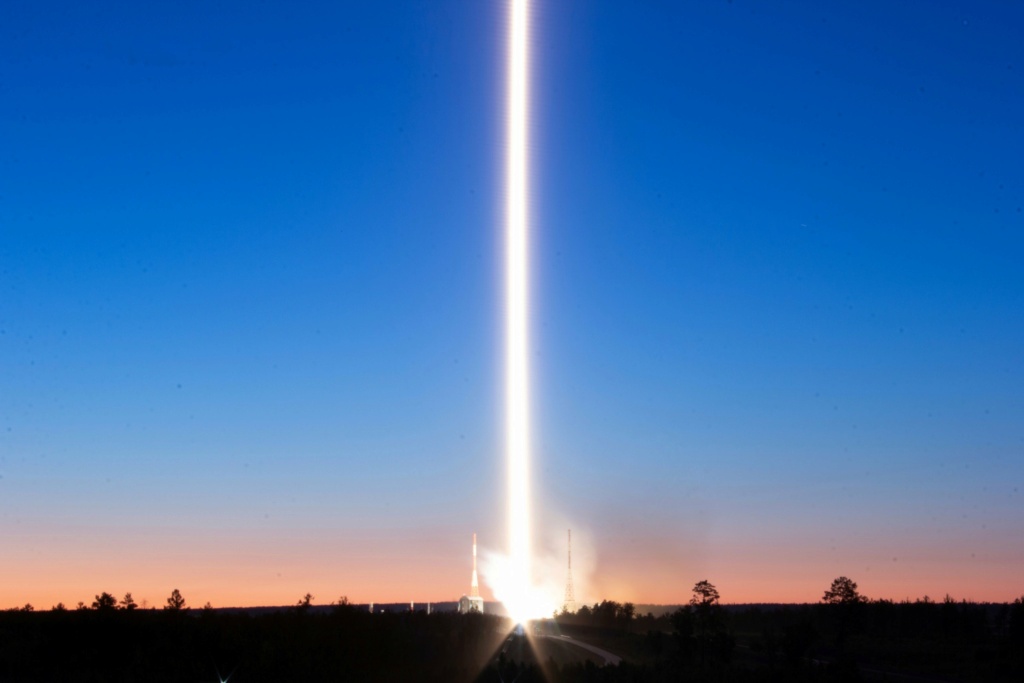


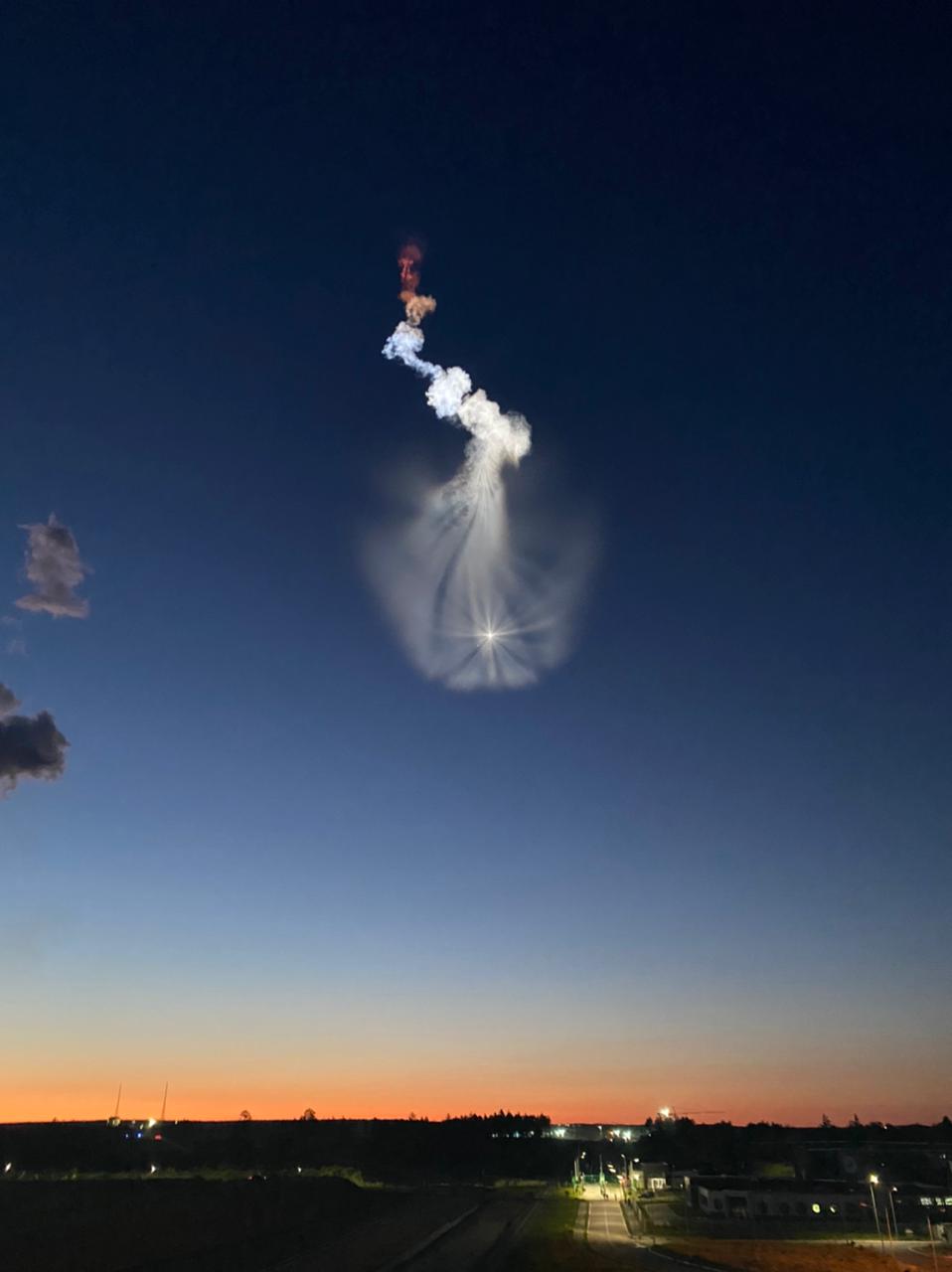
GarryB, dino00, Big_Gazza, kvs, PapaDragon, LMFS and Russian_Patriot_ like this post

Scorpius- Posts : 1499
Points : 1499
Join date : 2020-11-06
Age : 36
owais.usmani wrote:https://www.roscosmos.ru/31728/
Today, July 1, 2021, at 15:48:33 Moscow time, the launch crews of the subsidiaries of the State Corporation Roscosmos at the Vostochny cosmodrome launched the Soyuz-2.1b carrier rocket with the Fregat upper stage and 36 new spacecraft of the company OneWeb as part of mission 48. At 15:57 Moscow time, the upper stage separated from the third stage of the carrier on a suborbital trajectory.
So, this was the sixty-second successful orbital launch of Russian missiles in an ongoing accident-free series.
flamming_python, dino00, Big_Gazza, LMFS, lancelot and Russian_Patriot_ like this post

Big_Gazza- Posts : 4758
Points : 4750
Join date : 2014-08-25
Location : Melbourne, Australia
GarryB, flamming_python and LMFS like this post

thegopnik- Posts : 1782
Points : 1784
Join date : 2017-09-20
GarryB and Russian_Patriot_ like this post

Russian_Patriot_- Posts : 1286
Points : 1300
Join date : 2021-06-08
The Russian Space Systems Holding Company (RSS, part of the Roscosmos State Corporation) has completed production and is conducting acceptance tests of onboard command and measurement system equipment for the Luna-25 automatic interplanetary station. During the entire mission of the mission to the Moon, the new generation on-board radio engineering system developed at the RSS, in cooperation with the upgraded ground-based systems of the Mission Control Center, will provide real-time round-the-clock control and data transmission from the spacecraft, as well as monitor its technical condition. BA CIS is one of the main and most high-tech systems created in the RSS.
The onboard equipment of the command and measurement system and the ground-based control system of the automatic interplanetary station Luna-25 provide communication between the spacecraft and the Earth. The system transmits telemetry information, receives control commands, and monitors their execution. The command radio link transmits control actions to the spacecraft in the form of one-time commands and in the format of command and program information. The ground-based system measures the current navigation parameters of the interplanetary station's movement in real time, receives and transmits digital information arrays, relays signals to measure current navigation parameters,and performs reconciliation, phasing, and correction of the onboard time scale.
During the entire flight of the Luna-25 automatic interplanetary station, the onboard equipment of the command and measurement system will continuously transmit information about the state of onboard systems, telemetry information, and provide determination of orbit parameters for calculating correction pulses. This will make it possible to quickly make decisions during the implementation of the Luna-25 mission.
The system will also allow you to control the deployment of solar panels, the activation and functioning of the orientation system, and the operation of telecommunications systems of the Luna-25 automatic station. The instruments collect telemetry information from the spacecraft's systems and transmit it via the command radio link, as well as monitor the state of aggregates and complex devices.
Source: http://russianspacesystems.ru/2021/07/01/v-rks-zavershili-proizvodstvo-bortovoy-apparatury-luna-25/
dino00, Big_Gazza, thegopnik, LMFS and Hole like this post

George1- Posts : 18400
Points : 18897
Join date : 2011-12-22
Location : Greece
The launch of the Nauka research module to the orbital outpost was previously scheduled for July 15
https://tass.com/science/1311779
Big_Gazza, thegopnik, LMFS and Russian_Patriot_ like this post

thegopnik- Posts : 1782
Points : 1784
Join date : 2017-09-20
The development will be able to reduce the cost and availability of Russian launches. Roscosmos State Corporation has placed a preliminary order for the development of technical requirements for the parachute system of the return stage of space rockets. The development of the system, which in the future will help to compete with reusable rockets Rocket Lab and SpaceX, will be engaged in the holding "Thermodynamics" (part of the state corporation "Rostec"). Return of the rocket stage Rocket Lab Electron by parachute. Photo: Rocket Lab. According to the general director of "Thermodynamics" Igor Nasenkov, a pre-order from Roscosmos was received last month. This year they plan to start research work. At the same time, the timing of the creation of the system is still unknown, Nasenkov emphasized. "Eagle" and "Amur" The parameters of the parachute system for rockets are unknown, but their scale can be assumed using a similar system for a spacecraft. So, Igor Nasenkov told about the features of the parachute system for the promising spacecraft "Eagle". The system will receive three domes with an area of 1200 square meters. m each. This will allow the system to ensure the descent of cargo weighing up to 9535 kg. Now Technodinamika is working on prototypes of parachutes, and complex tests are planned for 2023. Testing will continue by dropping a full-size capsule from space, Igor Nasenkov added. Parachute system PBS-950. Such landing systems can become a reserve for the creation of return stages of missiles. Photo: Russian Defense Ministry Recall that in Russia since 2013, a reusable carrier rocket "Amur" has been developed. It is planned that in a reusable version, a rocket with a launch weight of 360 tons will be able to carry up to 10.5 tons to low Earth orbit (LEO). For comparison, the Soyuz-2.1b rocket can take only 8.2 tons for LEO. Amur will also receive an automated launch preparation system. All this will make launches cheaper. The estimated cost of launching a reusable Amur rocket (excluding the upper stage) will be $ 22 million - against about $ 45 million in which the launch of Soyuz-2.1b costs. The development of a reusable rocket will allow Roscosmos to reduce the cost of launch, which can attract new customers, and strengthen its position before private companies developing reusable rockets. Theory and example There are several systems that provide a soft landing of the first stage. So, on Falcon rockets, a complex complex is used, including three brake engines, rudders, a navigation system, and an orientation system. This provides an accurate landing, but significantly reduces the mass of the rocket's payload. Another example is the hard-wing return system (Energia-2), developed in the late 1980s by Soviet engineers. On the one hand, this would allow the stage to land at any airfield, and on the other hand, such a system also gives the rocket an excess share of additional weight. In 2001, a mock-up of the reusable accelerator of the first stage of the Angara rocket was shown. Model of the apparatus "Baikal" on which alternative ways of returning the stage were worked out But there are solutions that do not take the expensive mass of the rocket. These are air pick-up systems, and parachute landing. In the first case, you also need a parachute of a small area. Its goal is to reduce the speed for picking up the device by helicopter. Last year, the rocket Lab Electron rocket stage was returned in this way. In turn, a full-fledged parachute landing requires large-area systems to absorb the impact from landing. The development of synthetic fabrics made it possible to reduce the mass of large parachutes, which made it possible to create heavy-duty systems. For example, the military system PS-950 can "land" up to 13 tons of cargo, while the share of the system itself will be only about 12%. This allows you to take more cargo into orbit, while maintaining the possibility of reuse. However, this method requires an extensive platform of alienation, because such a landing system is uncontrollable.
kvs and LMFS like this post

Daniel_Admassu- Posts : 149
Points : 151
Join date : 2020-11-18
Age : 43
Location : Addis Ababa, Ethiopia
http://www.russianspaceweb.com/tem.html#2021
Big_Gazza and lyle6 like this post

Big_Gazza- Posts : 4758
Points : 4750
Join date : 2014-08-25
Location : Melbourne, Australia
thegopnik wrote:https://naukatehnika.com/mnogorazovoe-nachalo-roskosmos-zakazal-razrabotku-parashyuta-dlya-vozvrashhaemoj-stupeni.html
In turn, a full-fledged parachute landing requires large-area systems to absorb the impact from landing. The development of synthetic fabrics made it possible to reduce the mass of large parachutes, which made it possible to create heavy-duty systems. For example, the military system PS-950 can "land" up to 13 tons of cargo, while the share of the system itself will be only about 12%. This allows you to take more cargo into orbit, while maintaining the possibility of reuse. However, this method requires an extensive platform of alienation, because such a landing system is uncontrollable
The Soviets had worked out a parachute-based recovery system (c/w soft-landing rockets) back in the 80s, so that scheme could always be dusted off and applied to lage modular lift systems like Yenisei.
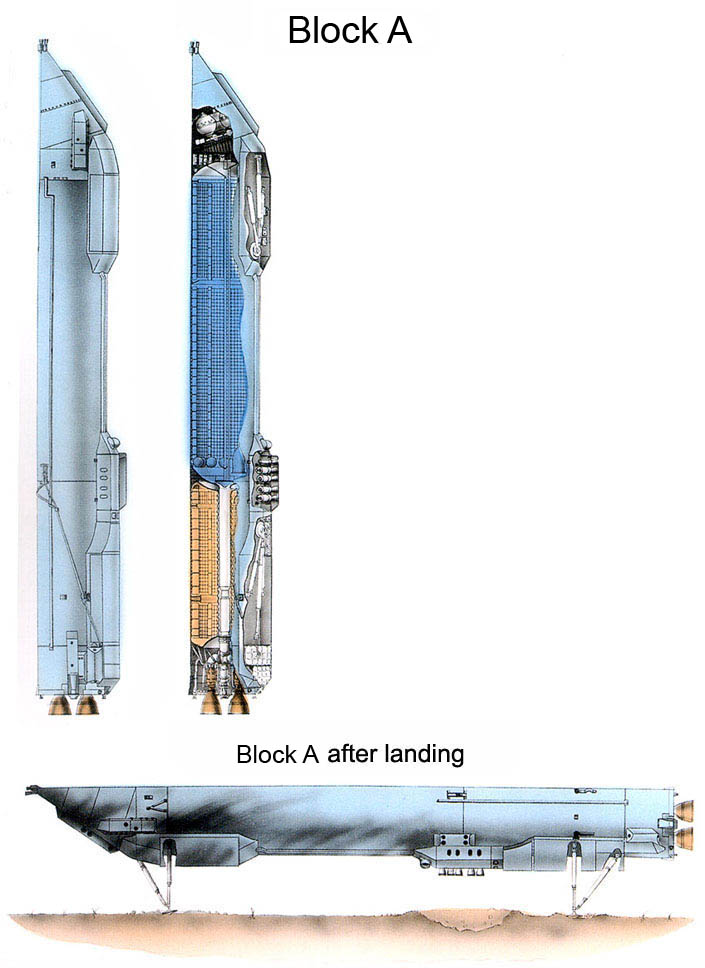

These were based on Zenit modules of the Buran-Energia SHLV, so the concept would be directly applicable to Soyuz-5 strap-ons of a Yenisei/Don stack.
GarryB, flamming_python, dino00, kvs, thegopnik and LMFS like this post

Russian_Patriot_- Posts : 1286
Points : 1300
Join date : 2021-06-08
The state corporation "Roscosmos" plans to order research work on the creation of a parachute system for the return stages of space rockets. Technodinamika Holding of Rostec State Corporation will develop the system, the holding's general Director Igor Nasenkov told reporters, TASS reports.
"Just a month ago, we received a preliminary order from Roscosmos to develop technical requirements for such parachute systems that can return reusable stages. We will start research work this year" he said.
According to Nasenkov, there are no exact deadlines for creating a parachute system yet.
Source:

Russian_Patriot_- Posts : 1286
Points : 1300
Join date : 2021-06-08
Scientists of The Moscow Aviation Institute offers to send an unmanned helicopter to Venus to research its surface and volcanoes.
In the spring, the Korolyov's Cosmonautics Readings opened in Moscow. The day before, a collection of abstracts based on the results of the readings was published.
"As a result of the development of aviation technologies, unmanned aerial vehicles are becoming more widely used. Currently, their application is being considered as part of the lander of interplanetary stations for research missions on the surface and inside the calderas of Venus ' volcanoes," one of the theses says.
The helicopter will have the shape of a sphere, the materials say.
Researchers note that the main problem in the development of Venus is the high temperature (467°C). In this regard, in the helicopter, the outer titanium layer with a diameter of 700 mm will have a wall thickness of 2.5 mm and is covered with screen-vacuum insulation-a material that is used for a large temperature difference between the insulated system and the environment.
In addition, it is planned to use aerogel, which has the lowest thermal conductivity.
Source:
dino00, kvs, thegopnik and LMFS like this post

Russian_Patriot_- Posts : 1286
Points : 1300
Join date : 2021-06-08
Roscosmos is planning the first space launches as part of a test of the parachute system for the promising Russian Orel spacecraft in 2024. This was announced to journalists by Igor Nasenkov, General Director of the Technodinamika holding of the Rostec State Corporation.
"Now we are at the stage of creating prototypes. Field tests are underway. We're on schedule. We plan to complete comprehensive tests in 2023. And in 2024, capsule drops from space should already begin, the first two drops will be without people" he said.
The head of the holding specified that a three-dome parachute system is being created for the Russian promising spacecraft, the area of one dome reaches 1,200 square meters. m. The parachute system will be able to withstand a load weighing 9,535 kg.
The advanced manned spacecraft "Orel" (formerly known as "Federation") is being created as part of the Russian lunar program.
Source:
dino00, thegopnik, LMFS and Hole like this post

kvs- Posts : 15480
Points : 15617
Join date : 2014-09-11
Location : Turdope's Kanada
Russian_Patriot_ wrote:Russian scientists have proposed sending a helicopter to Venus.
Source:
They should send a high altitude UAV where temperatures are lower but the density is still high enough.
https://www.researchgate.net/figure/A-diagram-of-the-mean-vertical-temperature-profile-in-Venuss-atmosphere-showing-the_fig7_322668645
https://www.nature.com/articles/ngeo2971
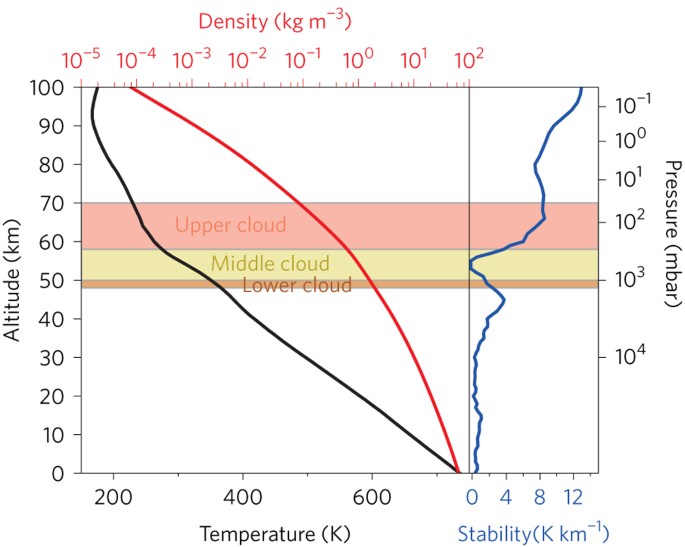
Since 273 Kelvin is 0 Celsius and the surface pressure on Venus is 100 atmospheres, flying around 40 km is possible without frying
the UAV.
GarryB likes this post

Russian_Patriot_- Posts : 1286
Points : 1300
Join date : 2021-06-08
I think that this would be more productive than a device flying near the surfaceThey should send a high altitude UAV where temperatures are lower but the density is still high enough.
|
|
|


 kvs
kvs